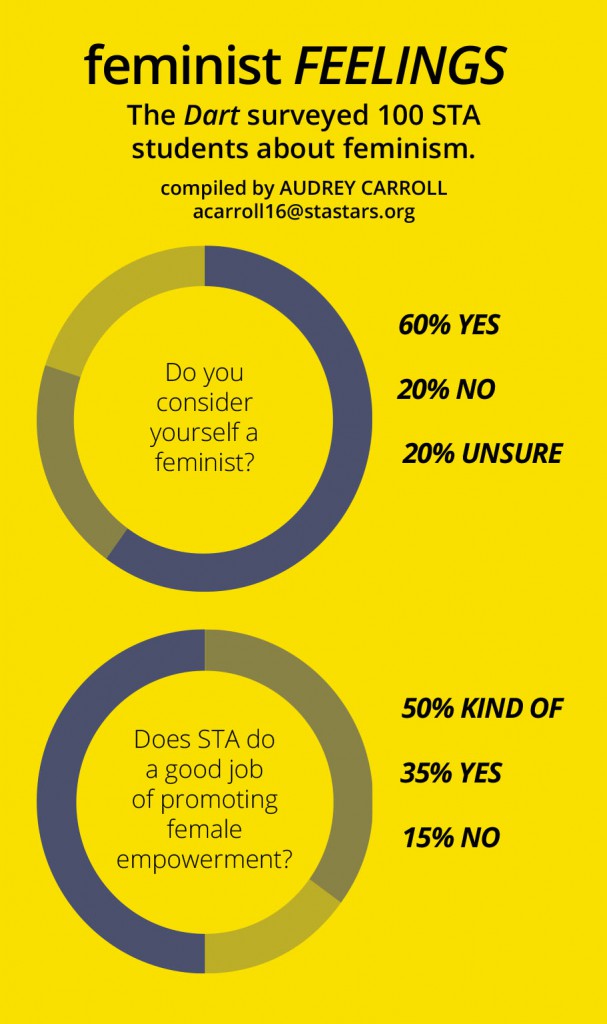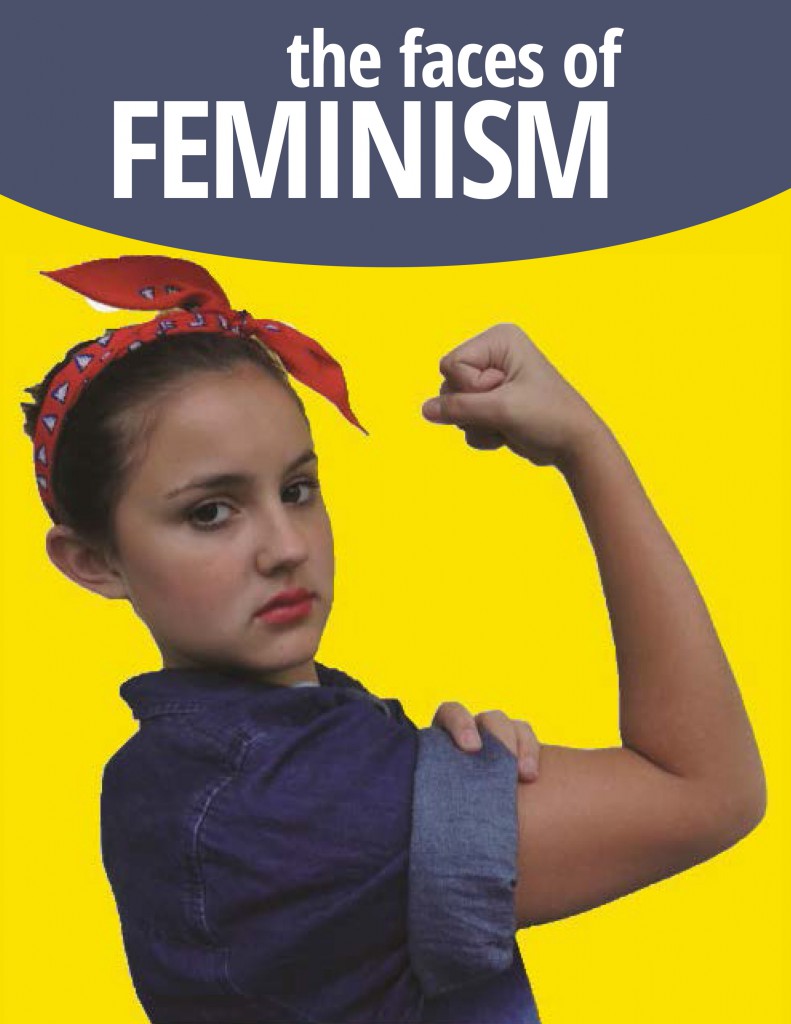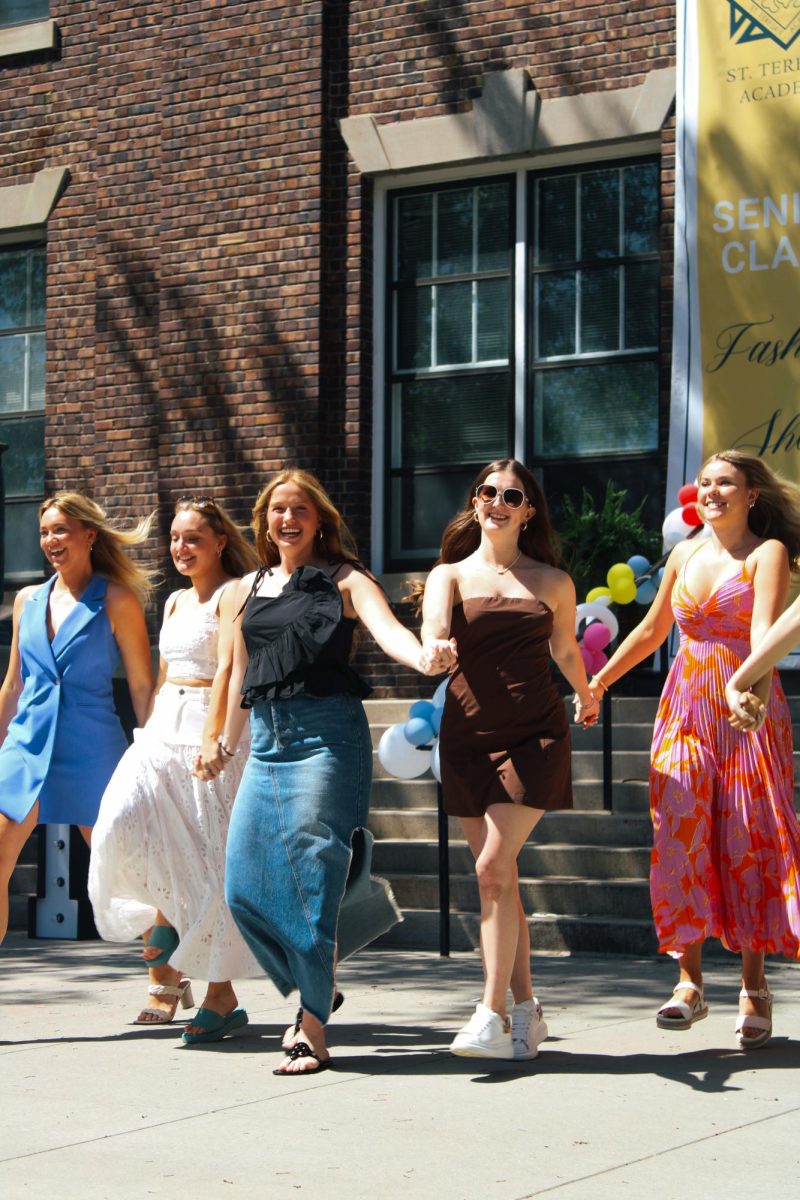by Christina Elias and Libby Hyde, photos by Maddy Medina and Eden Kreighbaum
Beth Blessent, Corinne Cooper, Ellie Culttur and Emmalyn McKinney were all participants in the South East Kansas (SEK) National Organization for Women (NOW) Sunflower Suffrage ride that took place in Lincoln Park in Pittsburg, Kan. They each heard of the ride through their Girl Scout troop and had learned about the women’s suffrage movement before the ride.
As 10-year-old girls, they understood the concept of suffrage, yet they were strangers to the term “feminism.” When asked if they knew what feminism is, Ellie Culttur replied, “Doesn’t it have to do with women?”
After their Girl Scout troop leader explained that feminism is the equality of men and women, the girls began telling stories of how they, even as 10-year-olds, have seen this equality violated.
Culttur remarked that as girls, they can not participate in some sports, such as football. Blessent immediately responded that it wasn’t that girls aren’t allowed to play those sports, but that it feels as though they aren’t supposed to.
But why is it that in society today, girls as young as 10 accept the idea that they can’t play football with boys?
Beth Blessent responded, “Because people believe girls are supposed to be weak.”
[nggallery id = 901]
In recent months, the media has placed the spotlight on different movements in support of and against the concept of feminism. Well-known public figures like Emma Watson have publicly supported the feminist movement through efforts like the HeforShe campaign, but for as much positive public attention some celebrities may bring to the issue, others, like Shailene Woodley, have publicly distanced themselves from the feminist label, while simultaneously claiming to support gender equality.
With these conflicting perspectives and understandings of the term and movement itself, young girls like Blessent, Cooper, Culttur and McKinney are left confused by what they should believe.
This confusion doesn’t stop at a certain age. Students at STA are also left wondering whether or not they support feminism.
According to a Dart survey that polled 100 random STA students, 60 percent said they considered themselves feminists, 20 percent said they did not and 20 percent said they didn’t have enough information to definitively say what they believe.

Similarly, 35 percent of students polled believe that STA does a good job of educating students about feminism, 15 percent said STA does not do a satisfactory job and 50 percent said it was somewhere in between.
National statistics shows that only 20 percent of Americans consider themselves feminists, according to a study published by the Huffington Post. Eight percent consider themselves “anti-feminists,” and 63 percent said they are neither.
So why are such a large amount of people uneducated about a movement that won women the rights many, including STA students, proudly exercise today?
According to Todd McGeorge, a resident of Pittsburg, Kan., whose wife is the secretary of SEK NOW, ignorance is the reason many misconceptions about the ideologies of feminism continue to dominate public opinion of the movement.
“Ignorance doesn’t mean stupid, it just means they don’t know, [especially] if you believe what the media tell you a lot of the time–and media has been driven by men up until the women’s movement started,” McGeorge explained. “If you watch old 40s TV shows and stuff like that, there was this real man-driven world, and the studios were all owned and run by men. And that kind of fed the misconceptions.”
Because of these misconceptions, feminism has become somewhat of a taboo topic in the U.S. The idea of gender equality is alive and well, but people hesitate to associate themselves with what is seen as such a strong word. Labeling one’s self as a feminist puts them at risk for being associated with many of the stereotypes society associates with feminism. According to senior Betsy Lehr, member of STA club Girls for Social Awareness, many of these stereotypes exist to keep the current social system in place.
“I feel like most of [the misconceptions] come from guys, and I feel like because people might call them out on their actions, they get really defensive about that,” Lehr said. “Oftentimes people don’t consciously hate; it’s more of an ingrained system, so they’ll think, ‘These people just hate men, that’s why they’re saying all these things to me in loud voices.’ And obviously, I mean, there are the stereotypes of man-hating, lesbian, hairy-pit [feminists], but I don’t think that any of those are necessarily bad.”
Misconceptions have become so widely-accepted in the United States, by both men and women, that an online group began a social campaign called Women Against Feminism, which allows women to declare that they don’t need or want feminism. Through pictures of themselves holding up hand-written signs, they explain why they reject feminism. Most of the signs supporters hold up in pictures, however, express core feminist ideology. Lehr explains that sexism is so ingrained in our society that on the surface, gender inequality isn’t always immediately apparent.
“I feel like that’s just internalized sexism, because a lot of the times, it’s your favorite shows, your friends and your family members that are sexist,” Lehr explained. “It’s fun to want to be in on the ‘Haha, look at these ridiculous people,’ and just sort of ignore that you yourself are being hurt [by those jokes], because a lot of women I know who are against feminism are white, upper class and straight, so they probably won’t experience as hard-hitting as someone who’s not as privileged in life as they are.”
These jokes contribute to the devaluation of the female gender as a whole, she says.
“I think that by taking [these jokes] in, by taking it lightly you can pretend that it’s not a serious issue,” Lehr said. “I think by joking about it, you make it sort of seem normal, like this is something that just happens and that you should accept it, but it’s really not. It’s honestly sort of a violet system and this devaluation makes your voice seem to not matter as much.”
Todd Modl, another resident of Pittsburg, Kan., and supporter of SEK NOW, says the best way for feminists to combat negative stereotypes is to make clear their mission, first by clarifying that the goal of feminism isn’t to give women supreme control over men.
“Well they might be able to say their platform and their [ultimate] agenda is equality, [but] some men might feel threatened that things are changing that they don’t want to change,” Modl said.“What I’m hoping happens with feminism and what [feminists] are trying to do is have an equal say.”
McGeorge, whose wife has “always been a feminist,” offers a different approach for feminists to change public opinion of feminism as a social movement.
“It all starts at home,” McGeorge explained. “I think that not being afraid to point that out to someone when you see them treating a woman in a way that’s not right.”
According to Modl, gender equality is something everyone should support and stand up for.
“Every individual, no matter their sex, has their strengths that they need to be able to play to, you know what I mean?” Modl said. “And everyone’s capable of learning different things. I don’t think that gender matters that much as far as being able to learn and do things and, well, mobilize in something like this.”









